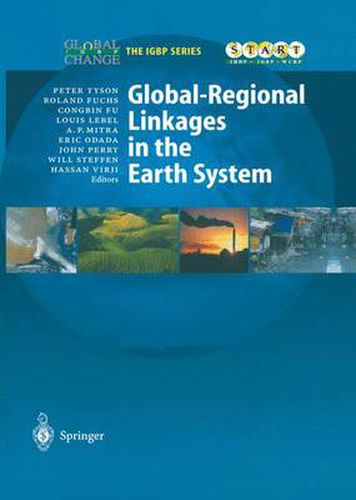Readings Newsletter
Become a Readings Member to make your shopping experience even easier.
Sign in or sign up for free!
You’re not far away from qualifying for FREE standard shipping within Australia
You’ve qualified for FREE standard shipping within Australia
The cart is loading…






This title is printed to order. This book may have been self-published. If so, we cannot guarantee the quality of the content. In the main most books will have gone through the editing process however some may not. We therefore suggest that you be aware of this before ordering this book. If in doubt check either the author or publisher’s details as we are unable to accept any returns unless they are faulty. Please contact us if you have any questions.
Global environmental change occupies a central niche in the pantheon of modern sciences. There is an urgent need to know and understand the way in which global biogeochemical cycles have changed over different time scales in the past and are likely to do so in the future. Equally important, it is necessary to determine the extent to which natural variability and that induce by anthropogenic activities are bringing about change. A number of international co-operative scientific programmes ad dress these issues. Chief among them are the International Geosphere-Biosphere Programme (IGBP), the World Climate Research Programme (WCRP) and the Inter national Human Dimensions Programme (IHDP) for global change. This book is one of a series of IGBP syntheses drawing together findings in global environmental change over the past decade or so. One focus of IGBP activities is the System for Analysis, Research and Training (START). Co-sponsored by the WCRP and IHDP, START establishes regional research networks for global change science in developing countries, stimulates and carries out global change research in developing regions of the world, and builds capacity to undertake such research at personal, institutional and regional levels. Several regional global change networks have been established, and much regional research has been accomplished in the last five years or so. In this book, work relating to four of the older START regions, Southern Africa, South Asia, Southeast Asia and East Asia, will be used as case studies to illustrate regional-global linkages in Earth System Science.
$9.00 standard shipping within Australia
FREE standard shipping within Australia for orders over $100.00
Express & International shipping calculated at checkout
This title is printed to order. This book may have been self-published. If so, we cannot guarantee the quality of the content. In the main most books will have gone through the editing process however some may not. We therefore suggest that you be aware of this before ordering this book. If in doubt check either the author or publisher’s details as we are unable to accept any returns unless they are faulty. Please contact us if you have any questions.
Global environmental change occupies a central niche in the pantheon of modern sciences. There is an urgent need to know and understand the way in which global biogeochemical cycles have changed over different time scales in the past and are likely to do so in the future. Equally important, it is necessary to determine the extent to which natural variability and that induce by anthropogenic activities are bringing about change. A number of international co-operative scientific programmes ad dress these issues. Chief among them are the International Geosphere-Biosphere Programme (IGBP), the World Climate Research Programme (WCRP) and the Inter national Human Dimensions Programme (IHDP) for global change. This book is one of a series of IGBP syntheses drawing together findings in global environmental change over the past decade or so. One focus of IGBP activities is the System for Analysis, Research and Training (START). Co-sponsored by the WCRP and IHDP, START establishes regional research networks for global change science in developing countries, stimulates and carries out global change research in developing regions of the world, and builds capacity to undertake such research at personal, institutional and regional levels. Several regional global change networks have been established, and much regional research has been accomplished in the last five years or so. In this book, work relating to four of the older START regions, Southern Africa, South Asia, Southeast Asia and East Asia, will be used as case studies to illustrate regional-global linkages in Earth System Science.